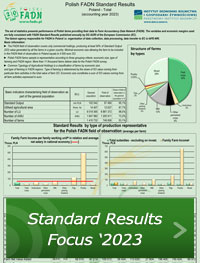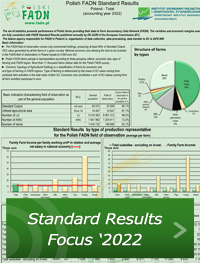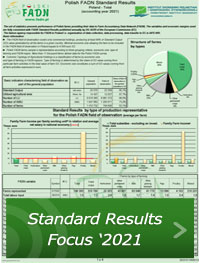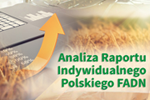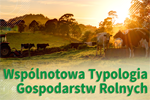Online courses of Polish FSDN
Currently, 11 e-Learning courses are available on the e-Learning platform. e-Learning courses are available only in Polish language. The course “General Rules and Objectives of FSDN” is publically available and can be viewed as a demo version (no login required).
-
From FADN to FSDN – when, how and why?
The course presents the main assumptions and stages of the transformation of the FADN system into the FSDN. It provides a clear overview of the basic legal acts regulating the functioning of the FSDN at both the European Union level and in Poland. Particular attention is devoted to the obligations of Member States and the benefits that participation in the system brings to farmers.
One lesson is dedicated to the farm selection plan and its implementation in the 2025 reporting year.
-
General Rules and Objectives of FSDN
This course is available to the public only in the Polish language.
The course reveals the nature, objectives and rules of the FSDN system, in both the European Union and Poland. It provides an opportunity to deepen knowledge about the Polish FSDN source documents, which are used to collect data from farms and the products produced annually under the Polish FSDN. It also allows participants to get familiar with the basic principles and criteria for classification of farms in accordance with the Community Typology of Agricultural Holdings. Additionally, the course explains the key concepts related to agricultural accounting. The knowledge gained on this course, can be tested and strengthen through interesting, interactive exercises. -
Analysis of the Individual Report
The course provides a comprehensive overview of the contents of the Individual Report tables and the correct interpretation of the data and results obtained on farms at the same time. The course includes numerous examples of correct data analysis, as well as guidance on which elements to pay attention to when interpreting the results. Upon completion of the course, each participant will be prepared to read the farm economic results independently and correctly.
-
Book of Receipts and Expenditure
This course focuses on the proper recording of receipts and expenditure in FSDN books and shows thematic links of receipts and expenditure with other events on the farm.
-
List of Assets and Liabilities and List of Selected Assets and Liabilities
This course is dedicated to the recording of assets and liabilities of the farm. It teaches how to record particular resources and liabilities of the agricultural holding in the tables. It also realizes the need for accurate and complete recording of the assets of the farm at the beginning and the end of the year.
-
General rules for determining of the sample of agricultural holdings
This course provides with knowledge on how to create selection plan and how to select farms for the sample of farms in Polish FSDN. You can also partake in the simulated conversation with a farmer whose farm is going to be selected for the FSDN.
-
Community Typology for Agricultural Holdings
In this course you will learn the objectives and rules, as well as basic notions operating within Community Typology for Agricultural Holdings according to the latest modifications introduced from 2025. You will also get instructions on the calculations of Standard Output coefficients for crop and livestock activities, as well as how to determine the economic size and the type of farming of agricultural holding using them.
-
Book of Events in Agricultural Holding
The course prepares for the correct and self-fulfillment of the Book of Events in Agricultural Holding (BEAH). Explains the basic rules for recording of a non-financial events that take place at a farm during the accounting year. In particular, indicates the accuracy and scope of data required in BEAH. After completing the course each participant will know both, the logical relationships between tables of BEAH, as well as between the different log books to collect source data from individual farms.
-
Individual Report
The course is designed for both advisors and farmers. It presents basic information on the Individual Report: the purpose of its creation, its structure, contents of tables. In addition, explains the main terms used in the report, and provides several examples explaining the most complicated issues. There are exercises on top of everything which are designed to test and strengthen acquired knowledge.
-
Comparative Report
The course is addressed to both advisors and farmers. It contains important information about the Farm Comparative Report: its characteristics, how to create it description of particular tables. The course contains a series of exercises designed to test knowledge and strengthen skills.
-
Dynamic Report
This course is designed for advisors supervising the Polish FADN/FSDN and advising farmers in financial analysis and for farmers keeping accounting books for Polish FADN/FSDN. By participation in this course, you can acquire practical skills: assessment of changes that have occurred in farm activities (resources of means of production, inputs, quantitative results, financial (income) results) in the course of 5 years of participation in FADN/FSDN and rapid assessment of changes in the economic situation of the agricultural holdings.



